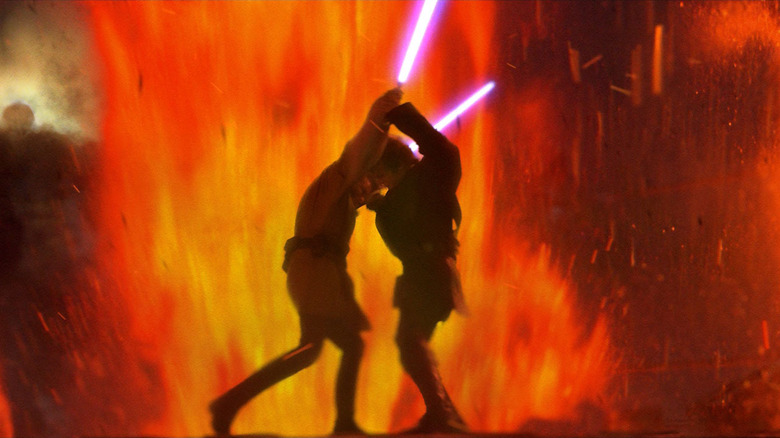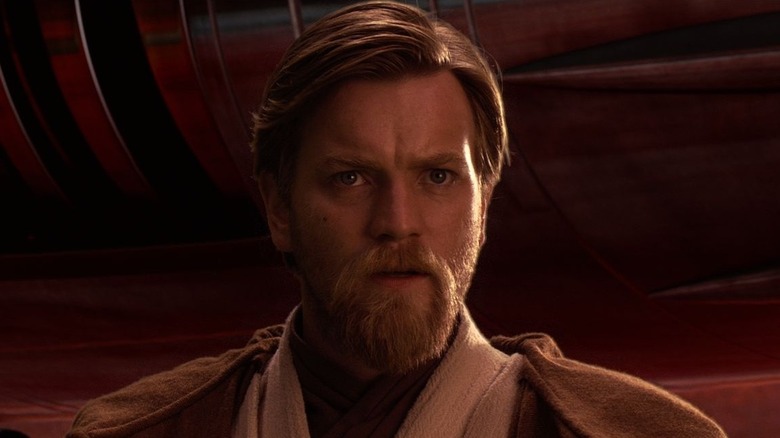Star Wars: Why Obi-Wan Kenobi Didn't Kill Anakin Skywalker On Mustafar
The lightsaber duel between Anakin Skywalker and Obi-Wan Kenobi on Mustafar is one of the most important moments in the entire "Star Wars" saga. For prequel fans, it's frequently cited as the single best fight in the franchise's long history. The whole trilogy builds up to it — the battle of brothers for the fate of the galaxy. And even though Obi-Wan claims victory in the end, he fails to deliver a killing blow.
For his first decade in exile on Tatooine, Obi-Wan believes that he did the job Yoda sent him to do — killing his best friend. On the Disney+ series "Obi-Wan Kenobi," he learns that Anakin survived their battle, and in the rematch that takes place at the end of that series, he once again leaves his former friend alive.
This second battle provides some clarity on why Obi-Wan may have left Darth Vader alive on Mustafar. "I ... think he doesn't believe Anakin will recover — he thinks he's going to die," "Revenge of the Sith" producer Rick McCallum told Empire in a 2024 interview marking the prequel trilogy's 25th anniversary. "It's only because Palpatine comes in and uses everything to save him and create this freak [that he survives]."
Obi-Wan believed Anakin would die on Mustafar
As shown in the "Obi-Wan Kenobi" show and mentioned by Rick McCallum, Obi-Wan fully believes he's killed Anakin after their duel on Mustafar. He severs his legs and leaves his body burning in lava. Just watching the film, it's easy to assume that Obi-Wan simply doesn't have the stomach to strike him down when he's so helpless and pitiful, but that's not necessarily the case.
In the novelization of "Revenge of the Sith," which isn't technically canon anymore, Obi-Wan actually thinks that putting Anakin out of his misery would be too merciful. It also suggests that he detects Darth Sidious' approach and decides to leave Mustafar quickly, fearing that lingering even a moment longer could put him in danger. He never suspects that Anakin's rage and Palaptine's dark side powers could be enough to keep him alive. The cyborg wraith that rises from the (literal) ashes is beyond what Obi-Wan could have anticipated in the moment.
Obi-Wan never has it in him to deal a killing blow against Anakin
Though Obi-Wan believes that Anakin will die after their battle on Mustafar, he's also clearly conflicted. He has the chance to kill Darth Vader for good 10 years later, and he once again chooses to walk away. This suggests that while Obi-Wan was willing to be the instrument of his friend's destruction, there's a certain line he won't cross. When Vader is unarmed and clearly beaten, he just can't bring himself to strike him down for good.
Perhaps this is motivated by some Jedi dogma — a fear that killing an unarmed opponent will lead to dark side corruption. Or, maybe, Obi-Wan simply can't bring himself to kill someone who was like a brother to him. When they're both fighting, anything goes, and Obi-Wan certainly doesn't hold back. But there's a difference between killing someone as they're trying to take your life and killing someone who's already lost.
In the end, of course, Obi-Wan's hesitance is rewarded. Without Vader, Palpatine may never have been defeated, and the Empire could have squashed the Rebel Alliance in "Return of the Jedi." One last way to read him leaving Anakin breathing is that he's giving fate up to the will of the Force. That ultimately leads to Vader's redemption and the destruction of Palpatine's regime.


